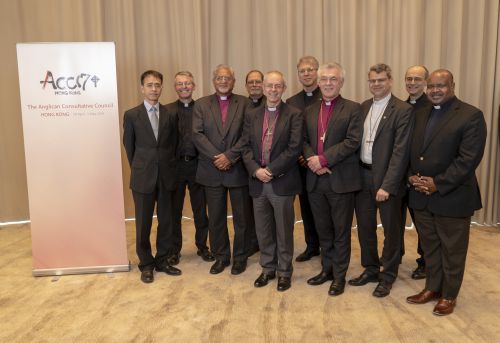The 17th meeting of the Anglican Consultative Council was held from 28 April to 5 May 2019; this is one of the four so-called Instruments of Communion linking Anglican Churches worldwide. Representatives from 37 of the 40 ecclesiastical Provinces of the Anglican Communion gathered at a luxury hotel in Hong King, where they enjoyed the overwhelming hospitality of the three dioceses of the Anglican Province of Hong Kong, Hong Kong Sheng Kung Hui. The representative of the Old Catholic Churches of the Union of Utrecht, Bishop Schoon, attended the meeting as an ecumenical guest.
The theme of the program was ‘ Equipping God’s People: Going Deeper in Intentional Discipleship’. This theme followed on from the previous meeting in 2016 in Lusaka, Zambia. Attempts were made at that meeting to overcome the disagreements that threatened to split the Anglican Communion, this was done by focusing on what unites the Anglicans. Intentional Discipleship refers to the Christian desire for a deeper relationship with Jesus so as to follow and serve him and thus spread the Christian faith in the world. During the Hong Kong meeting, video clips of Anglicans were shown bearing witness to their ‘Jesus shaped Life’ (JSL) in a ‘Jesus shaped World’.
The conference opened on Sunday, 28 April, with a Eucharist in Hong Kong Cathedral Church of St James; the Primas of the Province, Archbishop Paul Kwong, presided and the Archbishop of Canterbury, Justin Welby, preached. Every day began with Morning Prayer at the hotel where the sessions were held, followed by a half-hour Bible study on the story of the disciples on the road to Emmaus. Around noon the daily Eucharist was celebrated, then in the late afternoon there was Evening Prayer and later in the evening Compline. Even during plenary sessions, discussions were frequently interrupted to pray for or with each other. On Thursday, 2 May, delegates visited a project putting ‘Intentional Discipleship’ into practice. On 5 May, they worshipped with parishioners at the regular Sunday service in local parishes.
The agenda included all the usual reports for the past period: from the Standing Committee of the Anglican Communion, the Secretary-General of the Communion, and the many project groups, working groups, networks and initiatives in various areas. The issues that impressed me the most were the international women’s network ‘Women in Church and Society ‘ and the ‘Living in Love and Faith’ project launched by the Church of England. The latter dealt, in a variety of ways, with the complex issues of sexuality, human relationships, marriage and gender, but always with great care and expertise. This was preceded by a presentation of the’ Safe Church’ Guidelines, designed to prevent, insofar as possible, various forms of abuse and, should they occur, to ensure that they are handled in the best possible way for the victims. All the Provinces of the Anglican Communion represented at the meeting were keenly committed to the issue of safeguarding – and made this quite clear.
Ecumenism was only indirectly addressed. There were progress reports from the various dialogue committees as well as a report from the Anglican-Old Catholic International Coordination Council, which is the Permanent Council for the Cooperation of Anglicans and Old Catholics, particularly in Europe. The council’s mandate had expired and the Anglican Communion’s endorsement for a new round of consultations had to be sought. General approval was granted, but without any show of enthusiasm or questions relating to the report.
Ecumenism does not appear to be high on the Anglican Consultative Council’s agenda, as other reports have clearly shown. For the director of ecumenism at the Anglican Communion Office, Canon Dr John Gibaut, this was a sad end to his career as he moves to take up a university post in his native Canada. He is not alone in leaving the Office; the communications officer, Adrian Butler, also resigned and Canon Dr Terrie Robinson, who successfully built and led the above-mentioned women’s project for the past decade, is to leave for family reasons. Their successors were not yet known at the time of the meeting.
Bishop Dirk Jan Schoon

